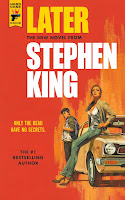I’ve often preached the good word about author Stephen King, urging readers to look beyond his horror proclivities—most of which he hasn’t fully embraced in decades—to recognize that he is, quite simply, one of the best authors writing today. His prose flows effortlessly, his plots are consistently imaginative (even if he doesn’t always stick the landing), and above all, he creates characters that feel fully lived-in. While I do enjoy the eerie, often unsettling situations that form the backbones of many of King’s novels, it’s the characters who keep me coming back.
Among the most compelling of those characters is Holly Gibney. What began as a supporting role in the Bill Hodges trilogy has evolved into something much larger—she’s now appeared in two standalone novels, a novella, and she continues to grow in complexity with each new outing. Clearly, she’s taken up as much space in King’s imagination as she has in ours. With Never Flinch, King brings Holly back for another dark, gripping mystery, cementing her place as one of his most enduring protagonists.
Detective Izzy Jaynes is at her wits’ end with her latest case. It begins with the Buckeye City Police Department receiving a letter from a disturbed individual threatening to kill thirteen innocent people and one guilty person, retribution, they claim, for a jury that wrongfully convicted an innocent man. The threat turns all too real when a murder victim is found clutching the photo of a juror involved in that conviction. When a second body turns up under the same circumstances, Izzy knows she needs help, and fast. She turns to her friend Holly Gibney.
Holly, meanwhile, has her hands full. As the head of the private detective agency Finders Keepers, she’s juggling multiple cases while working to keep the business afloat. Her latest assignment is serving as bodyguard to Kate McKay, a controversial and outspoken women’s rights activist on a multi-city speaking tour. While McKay’s events draw passionate supporters, they also attract aggressive detractors—one of whom has begun actively targeting her. What starts as disruptions quickly escalates, and Holly is brought on to provide protection. The task is anything but easy. Kate is headstrong, and the stalker is growing bolder, driven by wrath and a dangerous sense of righteousness. With two intense cases demanding her attention, Holly must work quickly to untangle both before more lives are put at risk.
In Never Flinch, Stephen King puts his beloved hero Holly Gibney at the center of two intersecting mysteries. There's no supernatural twist this time. As with her previous outing, the real horror lies in the monstrous acts ordinary people are capable of. Both plotlines build toward a convergence that showcases King at his page-turning best. That said, I found myself wanting to enjoy this novel more than I actually did.
Part of the issue lies in the setup of the two central cases, both driven by timely but overtly political themes. The injustices of the court system and the attacks on women’s rights are undeniably relevant, especially in today's climate. I often agree with King’s views, but here the political messaging felt more forced than organic, unlike the seamless way he incorporated COVID into Holly. The themes themselves are worthy. It's their execution that feels heavy-handed.
Then there’s the handling of queer characters. There is one possibly transgender character and two gay characters who seem to exist mainly to serve tragic ends. The language used doesn’t always reflect contemporary understanding or nuance, either. While I know King is passionately progressive on many issues, his portrayal of queer characters continues to lag behind the care and depth he affords others.
These missteps might have been easier to overlook if the mystery had delivered more surprises. The story builds nicely and ends in a satisfying place, but it all feels too predictable. Never Flinch is a decent crime novel, but it doesn't reach the heights of the best entries in the Holly Gibney series or in King’s larger body of work. I enjoyed it, but I expected more.
For more information, visit the author's website, Amazon, and Goodreads.
(2025, 46)





















